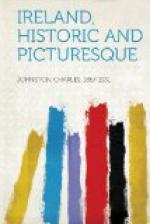We should doubtless fail utterly to understand the riddle of history, were we to regret the wild warring of these early times as a mere lamentable loss of life, a useless and cruel bloodshed. We are too much given to measuring other times and other moods of the soul by our own, and many false judgments issue from this error. Peaceful material production is our main purpose, and we learn many lessons of the Will embodied in the material world when we follow this purpose honestly. But before our age could begin, it was necessary for the races to come to personal consciousness. This end seems everywhere to have been reached by a long epoch of strife, the contending of man against man, of tribe against tribe. Thus were brought to full consciousness the instinct of personal valor, personal honor and personal readiness to face death.
Only after this high personal consciousness is kindled can a race enter the wider path of national life, where vivid and intense individuals unite their forces to a common end, reaching a common consciousness, and holding their power in common for the purposes of all. After the lessons of fighting come the lessons of work. For these lessons of work, for the direct touch with the everlasting Will gained in all honest work, our own age is to be valued, far more than for the visible and material fruits which that work produces.
In like manner the old epoch of war is to be esteemed for the lessons it taught of high valor, sacrifice, heroic daring. And to what admirable ends these same qualities may tend we can see in a life like that of Colum Kill, “head of the piety of the most part of Ireland and Scotland after Patrick.”
Yet the days of old were grim enough to live in. Let this record of some half-century later testify. It is but one year culled from a long red rank of years. We give the Chronicler’s own words: “645: The sixth year of Conall and Ceallac. Mac Laisre, abbot of Bangor, died on May 16. Ragallac son of Uatac, King of Connacht, was killed by Maelbrigde son of Motlacan, of which was said:
“Ragallac son
of Uatac was pierced on the back of a white
steed;
Muiream has well lamented him; Catal has well avenged him.
Catal is this day in
battle, though bound to peace in the
presence
of kings;
Though Catal is without
a father, his father is not without
vengeance.
Estimate his terrible revenge from the account of it related:
He slew six men and fifty; he made sixteen devastations;
I had my share like another in the revenge of Ragallac,—
I have the gray beard in my hand, of Maelbrigde son of Motlacan.”




